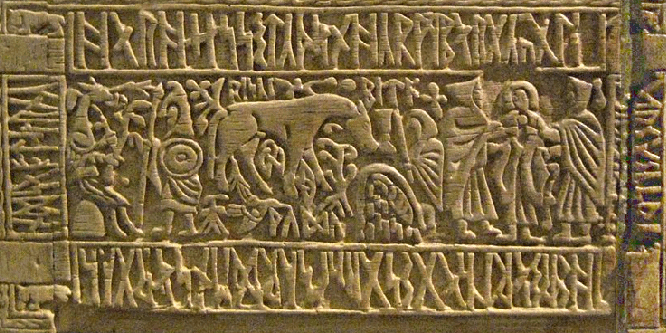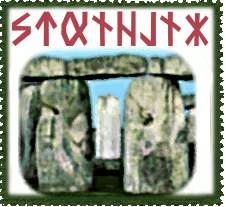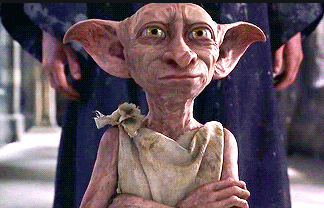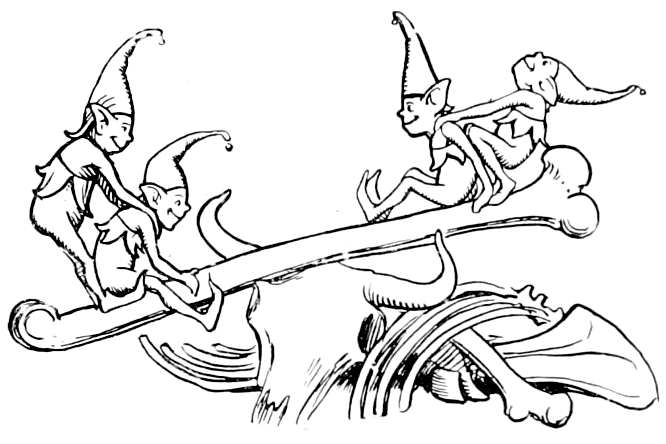6. Our best Types were still not good enough
|
Wæs se grimma gæst Grendel haten,
mære
mearcstapa, se þe moras heold,
fen & fæsten.
Fifelcynnes eard
wonsæli wer weardode hwile,
siþðan
him Scyppend forscrifen hæfde
in Caines cynne. Þone
cwealm gewræc,
ece Drihten, þæs þe he
Abel slog.
|
There was this grim guest, Grendel called.
Marches, steppes
until the moors he held,
Fens and fastnesses. Wives-kin's
Earth,
Was living with the undead awhile,
Since him the
Creator fore-scribed had
In Cain's kin. Done was torturing
wrecking,
to these Thirds, for that he Abel slew.
|
|
Ne gefeah he þære fæhðe, ac He hine feor
forwræc,
Metod for þy mane, mancynne fram.
Þanon
untydras, ealle onwocon,
eotenas & ylfe &
orcneas,
swylce gigantas, þa wið Gode wunnon
lange
þrage. He him ðæs lean forgeald!
|
Not liked He this feud, as He henceforth wrecked, Meted for the
men of mankind from Then on the Untidy, all awakened:
Jœtes
and Elves and Orcs,
Such giants who with God wrangled
Long
a carry. He him that lean repaid!
|
Now what the hell is that? Sire, these are verses
from the old English poem ›Beowulf‹. The name Grendel
should be known to all readers with a little classical education and
to fans of movies too. That Anglo-Saxon poem stands at the onset of
today's English literature. It's just a crude fantasy tale from old
Denmark, and as realistic and wise as a Harry Potter book, but since
this stuff is so old and traditionally Christian, it is much more
accepted by the teacher types. The poem takes us back into the savage
mental world of the Nordic Vikings. The above verses (77 etc.) tell
us of the origin of the monster Grendel. That's the main rogue of
this poem. The poem has it that Grendel was a monster that lived in a
water cave. At night it entered the houses to feed on sleeping men.
Now, isn't it a great idea to have such people with us, from the
modern point of view of diversity?
The ghastly world of the poem of Beowulf is replete
with monsters, and these are all bad beasts who need to be slain by
the hero. Noteworthy is that this poem also counts in Jœtes and
Elves, and Orcs of course. Jœtes are in principle the people
from Jütland, that is Northern Denmark. But here the name rather
means mythical bad giants, like those known from the Bible and the
ancient Greek religion. Like Elves or Orcs they don't appear in this
fantasy tale. Instead the hero Beowulf mainly fights with marine
monsters. The name Grendel reminds of our word green, and indeed it
sounds likely that the name means Green One, reminding of the Arab
fantasy saint al-Khidr. This good spirit of vegetation fits much
better into our real world, as seen by the UTR. In fact there are
angels, gigantic good aliens who help us not only with odd fantasies.
Some of the Ranoids, who descended from frogs, indeed have green frog
skin. When our goddess Ga-Jewa was still space-bound, dwelling among
undead Greys, and later when Ewa created her Earth, Ranoids helped
her with emotional support. In our fantasies they occasionally
represent the evil aliens too. That help allows it to the gods to
control fantasy figures and let real badies die faster.
In the real world, feuds and mischief would wreck
so many young lives in the North. Bitter traces of these tales can
also be found in the poem ›Beowulf‹. There was the
story of Hygelac, one king of the Gauts from Southern Sweden. As a
Viking he sailed, to raid Frisia and North-Deutschland. Around 516 a.
he was killed by the Chattuarians. Hygelac was famous for his size.
After his death they exposed his bones. As a "giant" he
appears in a ›Book of Monsters‹. Jœtes (Deutsch:
Jöten) was one of the traditional names given to giants.
That name denoted the inhabitants of Jütland in Northern
Denmark. Around the year 450 a., Hengest had sailed from there with
three warships to win land in England. Not much later those
Anglo-Saxons overpowered the Romano-British lords and men of king
Vortigern, by a treacherous assault. Kent subsequently was conquered
by these Jütlanders. Others also won the rest of the British
Isles. In principle Hengest could have become a famous national
founder and hero of Anglo-Saxon Britain, maybe comparable to Julius
Caesar. But another story of Hengist shows him as a guy too mean for
that, an outlaw who broke oaths. The saga of the battle of the
Finnsburg has it that Hengest was spending the winter there with his
war band (432 a. ?). Peace had been made with the Frisians after a
stalemate raid. But early next year Hengist killed his host Finn, and
abducted duchess Hildeburg with much booty. The poem tells a shocking
truth: Even our big, fair, sly Nordic men may not be good enough to
resist to evil!
Today's scholars explain the ruthless and
battle-happy Vikings with the notion that these had still been
pagans. However, later Christians like the Frankish king Chlodwig,
often were even more treacherous and ignoble. Wyrd, the power of
destiny, played so mean tricks on them! In principle they believed
that the gods were protecting them. The gods should see to it that
oaths were kept and mishaps avoided. But such good hopes did not meet
the reality of tricky and cruel destiny. We may think of the
half-mythical Beowulf as a Nordic seer. In dreams he did let his mind
wander, to find out who was out there. Who made this bad destiny for
them? Beowulf did not envision Nordic gods. He met monsters in
strange wildernesses. The tale has it that Beowulf battled nightly
monsters of the sea, that he was killing strange sea-monsters. The
poem boasts that Beowulf was the son of Eggtheow, the king of the
Gauts. But an older tale has it that his mother was the servant maid
Bera, who was made pregnant in the night time, by a man wearing a
bear's hide.
So that was the reason why in the poem Beowulf had
no other kinsmen but his "uncle", the king. The main tale
of the epos ›Beowulf‹ has it that Beowulf killed the
troll Grendel and his mother, who lived below a cliff and were
devouring the men of the Danish hall of Heorot (today: Lejre). Some
scholars put this mythical feat into the year of 512 a. But that was
the exact time when the Hadubarden of Ingjald took revenge there.
Breaking peace oaths and marriage bonds, they fought with the royal
Danes until their hall went up in flames. Of course there were no
nightly monsters, who sowed misery and doom, just because they hated
it when the guys in the hall drank mead all the time and cheered
happily – or were there? The UTR warns before the nightly
attacks of the N-rays from outer space. The Greys who are angling
with rays notice it, when people down here get too lazy and depraved.
They may put bad ideas into their minds, and force them on
disrespectful ways, or just make them get sick and old faster. The
epos also fantasizes of the fight of Beowulf against a dragon. Often
this beast is called a night flyer, who spits fire down from the sky
that sets halls and huts ablaze. For such mishaps the Greys tried to
blame the Earth Goddess. She too was eventually regarded as a dragon
or a reptile monster, since she originates from a planet where not
humanoids but reptiloids were the intelligent species. At times the
Earth Goddess even appeared as a dragon-lady of dawn, announcing the
sure coming of her messiah, symbolized by the Sun. Her gigantic halls
down in the deep are full of machines and artful pieces. When it is
written that she is a poisonous dragon, that refers to the special
climate of her Betyle that men cannot survive. She also heeds lots of
lost treasures from times long gone, for me to retrieve them some
fine day.
In one book about Medieval literature I read about
the famous Hunnish king Attila. He engaged Germanic bards to sing his
praise. But of his Asian cruelty remind the horrible Icelandic songs
of Atli. Truly the peoples of Europe called him "the scourge of
God", since he had been so bad and savage and belligerent. From
the modern point of view of diversity, some dopey guys would even
welcome the Huns, surly ready to part their property with these and
their sluts too, hoping that this would render Europe racially more
diverse. But when the Christians raise and spread migrants of such
hated sorts, it's not because they hope that these will enrich our
cultures. Their idea is it that God sends these to us for a reason.
These are supposed to bring us down, and to turn this fairly nice
world into a hell of depravation – a planet that would be ready
for doomsday. We find this basic idea of hereditary sin and divine
revenge nicely explained in the above cited lines of the poem
›Beowulf‹. For the death of Abel, allegedly the Creator
took sore revenge on all humankind. Allegedly God created monsters to
avenge, including those with a human body.
Wasn't even Hengest, this most renowned hero of the
Anglo-Saxons, some kind of monster man? In the poem ›Beowulf‹
we often read about a bad superstition of that era. Again and again
boars and piglets are mentioned there. Pig images adorned many a
helmet, armour or sword. They were supposed to bring luck to the
people who wore them. Due to a feud over Sviagriss, a ring adorned
with a piglet, the proud realm of the Gauts was destroyed. At last
the UTR now warns before the bad magic of the Feken. Due to my
warnings, many boar-head stickers disappeared from our cars.
In the poem ›Beowulf‹ the mythical
Biblical hero Abel replaced Balder, the Germanic god of light. He
stands for a fair hero who didn't make it, who died to then let a
deluge come. The Greys would indeed use such a cataclysm, to try and
create mischievous monsters.




 This
odd image shows the Elf Dobby. It's from a Harry Potter movie. The
rather dark saga of this sorcerer apprentice was created by the
British author J. K. Rowling. If we search for cultural stuff that
has shaped and reshaped not only the culture of Britain, then surely
this saga needs to be mentioned. For many it's just entertainment.
But is there more to it than Harry Potter readers and movie
spectators may be able to believe? Surely the answer to the question
depends on whether magic truly exists or not. From the point of view
of the UTR, it is absolutely correct when Ms. Rowling wrote about
muggles, "normal" people who can neither see magic nor
believe in it.
This
odd image shows the Elf Dobby. It's from a Harry Potter movie. The
rather dark saga of this sorcerer apprentice was created by the
British author J. K. Rowling. If we search for cultural stuff that
has shaped and reshaped not only the culture of Britain, then surely
this saga needs to be mentioned. For many it's just entertainment.
But is there more to it than Harry Potter readers and movie
spectators may be able to believe? Surely the answer to the question
depends on whether magic truly exists or not. From the point of view
of the UTR, it is absolutely correct when Ms. Rowling wrote about
muggles, "normal" people who can neither see magic nor
believe in it.